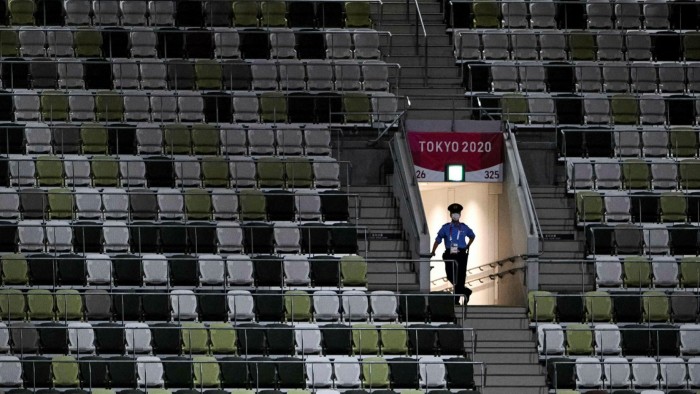A trinity of ghosts haunts the Tokyo Olympics


Roula Khalaf, Editor of the FT, selects her favourite stories in this weekly newsletter.
As the Olympic countdown clock outside Tokyo Station ticked over to zero and the first selfie-takers arrived to capture the moment, the host city awoke in a muck sweat. And not just because the “mild” weather promised in the bid document has yielded to the belligerent flambé of a normal Japanese summer.
The discomfort arises from Japan’s continuing visitation by the ghosts of three Olympics: past, present and future. The question is whether some epiphany will emerge from this grand morality tale.
Japan’s engagement with the Ghost of Olympics Past is the most straightforward: the spectre floats above the national pillow as a memory of what it was like to be an ambitious country with its greatest days ahead. The 1964 Tokyo Games were billed as Japan’s triumphant re-emergence as a modern industrial power on the global stage. It is not hard to see why, in 2012, a bludgeoned, post-quake Japan should have wanted so dearly to recapture some of that spirit with another Olympics.
The Ghost of Olympics Present, meanwhile, besets Japan with the chain-rattling double-haunting of the choices it has made and what might have happened in a world without Covid-19. The decision to hold the Olympics in a pandemic was taken despite public opposition, rising infections in and outside the Games’ self-declared “bubble” and unambiguous warnings from Japan’s leading medical voices.
The government has taken an almighty risk in knowingly sacrificing the moral authority it will need once the circus has left town. It appears to have done so on the finest of gambles that the Japanese public will always despise and blame the silken manipulators of the International Olympic Committee slightly more than it does members of its own government.
At the same time, the two-week spectacle will provide constant apparitional glimpses of the “otherwise” Tokyo 2020 Games — the wondrousness of the show the city had spent $25bn to put on, but must now stage before a phantom audience watching only on TV. The impeccable sports venues, organisation, generous welcome of the volunteers and sheer greatness of Tokyo the city will still be visible, but maddeningly out of reach behind the realities imposed by the pandemic and the contrived countermeasures of the organisers.
The third wraith — of Olympics Future — helps explain why Japan decided to hold the Games in the face of so much that might quite reasonably have cancelled or postponed them. This ghost comes wearing the trappings of the Beijing 2022 and Paris 2024 Games — entries in the global diary that a sullen Japan has guessed will definitely go ahead. They will do so, Japan judges, in what will by then be a world that has accepted, however uneasily, its long-term “with-Covid” fate. In that scenario, 2020 will have been the only Games seriously threatened with cancellation and Tokyo does not want, at a visceral level, to be the city the torch skipped once in wartime and once in peace.
As with any morality tale, the three visitations have laid bare the worst qualities of the subject. The long run-up to the event has emitted a steady stream of scandal and unforced error, the sort of stuff that exasperates many Japanese about their companies, bosses, government and media. The sackings this week of two men central to the opening ceremony — one for having humiliated disabled children and boasted about it, the other for a Holocaust joke — added to a list of setbacks (including the Tokyo 2020 chairman resigning over sexist remarks and the head of the Japan Olympic Committee resigning over a French corruption investigation) that have felt wholly avoidable.
To keep up to date with the latest Olympic developments, click the button “Add to myFT” at the top of this page
To many following Japan’s Olympic saga, these face-slaps — sexism, racism, bullying — point to fundamental and too often unaddressed shortcomings in Japanese society. So when, in March, Hiroshi Sasaki quit as creative director over reports he had suggested a plus-sized female comedian should appear in the opening ceremony as an “Olympig”, my conversations with Japanese friends were not about the reprehensibility of the individual, but of the inherent awfulness of the environment that had allowed someone like him to rise so high and formulate ideas so abhorrent.
The current thrill is watching people and behaviours that have festered so long without consequence being so rapidly felled. Over recent months and for the next two weeks, Japan feels watched in a way that it has perhaps never done before — by a world laser-focused on the country as host of a Games primed for error, and by its own people delighting in the phenomenon of a government in moral deficit that cannot, temporarily, be seen to endorse anything remotely suspect. Historic wrongs, in this strange Olympic window, may be righted.
But does that translate into a mood of change that can survive beyond the closing ceremony on August 8? The answer, disappointingly, is probably not. The sensation of being so minutely scrutinised will pass; the haunting will prove temporary; Japan, which has become a master in the art of dancing as if nobody is watching, will awake and conclude it was all just a dream.
Letter in response to this column:
Olympic Games does not deserve the bad rap / From Liang Hong, Tokyo, Japan
Comments